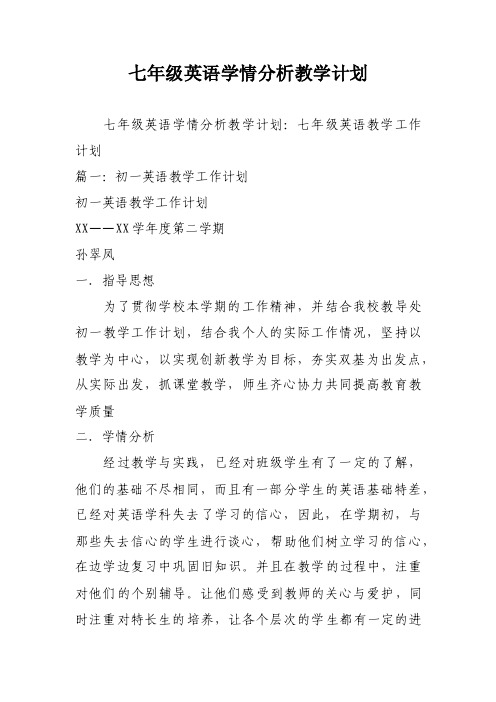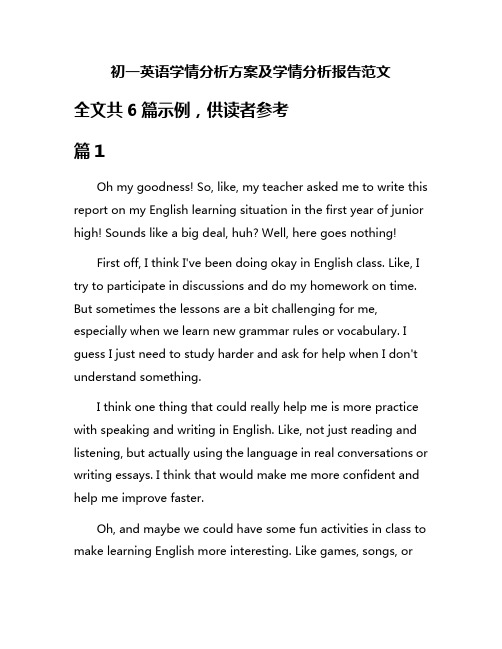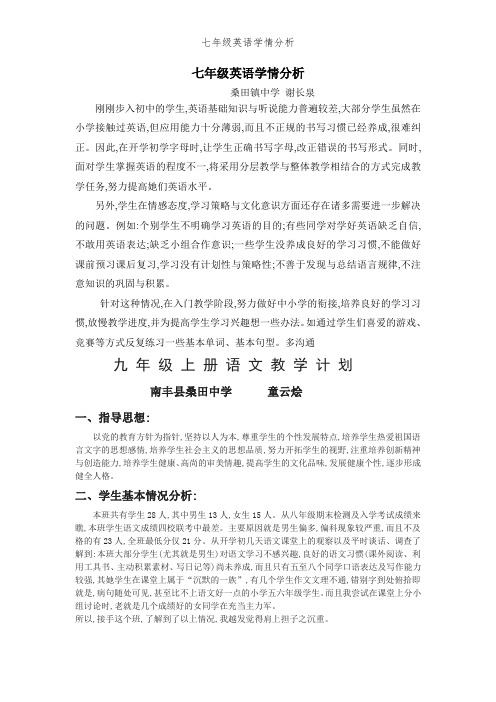七年级学情分析-英语
七年级英语学情分析教学计划

七年级英语学情分析教学计划七年级英语学情分析教学计划:七年级英语教学工作计划篇一:初一英语教学工作计划初一英语教学工作计划XX——XX学年度第二学期孙翠凤一.指导思想为了贯彻学校本学期的工作精神,并结合我校教导处初一教学工作计划,结合我个人的实际工作情况,坚持以教学为中心,以实现创新教学为目标,夯实双基为出发点,从实际出发,抓课堂教学,师生齐心协力共同提高教育教学质量二.学情分析经过教学与实践,已经对班级学生有了一定的了解,他们的基础不尽相同,而且有一部分学生的英语基础特差,已经对英语学科失去了学习的信心,因此,在学期初,与那些失去信心的学生进行谈心,帮助他们树立学习的信心,在边学边复习中巩固旧知识。
并且在教学的过程中,注重对他们的个别辅导。
让他们感受到教师的关心与爱护,同时注重对特长生的培养,让各个层次的学生都有一定的进展。
三.具体工作教学工作1.制定科学,合理的计划。
在新生开学前,力求定好学校要求的各项计划,做到切合实际,实效性强,具有可行性,合理,规范。
2.备课,教案,作业。
备课:备学生,备教材,备教法。
备好课是上好一堂课的关键。
学生的原有的认知结构与新知识之间的内在联系,需要教师的点拨与指导,注意学生间的个体差异,因材施教,对症下药,调动一切力量去激发每个学生的积极性;在教学方法上利用启发式教学,溶趣味性与情境教学于一体,通过设问,质疑等方式,创设问题情景,激发学生的求知欲与好奇心,引起他们新的探究活动。
做到低起点,小步走,快节奏,多活动,快反馈,勤矫正,多鼓励的一系列步走,教学管得策略。
而这一切对教师的要求是必须对教材步走,教学管得策略。
而这一切对教师的要求是必须对教材能够达到运筹帷幄,做课堂的组织者,指挥者,开拓者和引导者。
3.教案:教案制作应新课改的要求,写好各环节,在注重形式的基础上,注意教案的实效性,与可行性。
力争做好教学反思,尽量写教学札记,做到理论指导实践,实践强化反思,反思完善理论,循环而有序,为自己,为学生完成一份满意的答卷。
七年级英语学情分析

七年级英语学情分析学生基本情况分析:对小学升入初中的初一学生来说,经历了三年基本的小学英语学习后,对英语的基本知识有了一个大概的了解。
1、农村学生与城市学生在英语学习中存在很严重的差距,而且这种差距在进入初中阶段后越来越大,随着学科的增加,知识量的加大,农村学生对教材的不适应,中小学的教材在教学重点上有所区别,以知识的广度和深度为主,培养学生学习应用为主,学习对自己有用的知识,各科的知识压力大,所以学生的在短时间内很难转变小学生那种学习方法。
2、农村的生源基础相对较薄弱。
多年来,由于各种因素,和城区的学生比较存在很大差距。
3、由于学生学习成绩基础不是很理想,所以目前很难在短时间内提高他们的英语学习能力,语言的表达能力欠加。
由于没有养成好的学习习惯,所以分析题的难度不是很难都难以解决,所以学生学习缺少热情。
二、思想状况分析:通过观察了解,发现大部分学生的学习目的性明确。
学习积极性高,能主动的学习,有70%的同学有上进心,但主动性不够,需要老师的引导,但也有10%左右的学生学习目的不明确,一天贪玩好耍,不能积极主动的完成学业,甚至不能完成老师布置的作业,大部分学生正处在生长发育的高峰期,一方面他们对因青春期生理、心理急剧变化而产生的丰富而深刻的感受和体验,有诸多成长的烦恼;另一方面面对沉重的学习、升学压力和开放的社会环境带来的各种刺激和诱惑,难免不知所措。
渴望与他人交流,存在早恋心理;生理上进入迅速生长发育时期,心理上进入一个错综复杂,充满矛盾的时期,加上家庭因素影响,极易形成烦躁、逆反心理;由于生活空虚,缺少爱、缺少交流,零花钱作祟,容易沉迷于网络;……他们有广泛的爱好和兴趣,如篮球、台球等各种兴趣。
有80%的学生心理素质较稳定,思想健康,人格健全,性格开朗,能和老师沟通。
能按照老师的要求完成学习任务;有10%左右的学生情绪波动大,容易激动,怕吃苦,不愿劳动,甚至个别的还有耍“小皇帝”脾气的。
(三)、学习状况分析:七年级是一个产生剧烈变化的时期,更是一个危险的时期,也是一个爬坡的时期,是一个分水岭。
初中英语学生学情分析范文

初中英语学生学情分析范文Learning a foreign language can be a challenging and rewarding experience, especially for young students in junior high school. As they navigate the complexities of the English language, these students face a unique set of challenges and opportunities that shape their language learning journey. This essay aims to provide an in-depth analysis of the learning situation of junior high school English students, exploring their motivations, difficulties, and strategies for success.One of the primary factors influencing the learning situation of junior high school English students is their level of motivation. At this age, students may be more susceptible to external influences, such as parental expectations or peer pressure, which can either hinder or enhance their motivation to learn English. Some students may be intrinsically motivated, driven by a genuine interest in the language and a desire to improve their communication skills. Others may be extrinsically motivated, seeking to achieve good grades or secure better educational or career opportunities in the future.Regardless of their initial motivation, junior high school English students often encounter a range of challenges that can impact their learning progress. One common challenge is the complexity of the English language itself. From mastering grammar rules and vocabulary to developing proficiency in the four language skills (listening, speaking, reading, and writing), the sheer volume of information can be overwhelming for some students. Additionally, the transition from primary to secondary education can be a significant adjustment, as students are expected to take on more independent learning responsibilities and adapt to a more rigorous academic environment.Another challenge faced by junior high school English students is the diversity of their language proficiency levels within the classroom. In a typical junior high school setting, students may have varying degrees of prior exposure to English, leading to a wide range of language abilities. This can make it challenging for teachers to cater to the individual needs of each student, potentially leaving some students feeling left behind or struggling to keep up with the pace of the class.Despite these challenges, junior high school English students also possess unique strengths and opportunities that can contribute to their language learning success. Many of these students are at a critical age where their cognitive abilities are rapidly developing,allowing them to more easily acquire new language skills and patterns. Additionally, junior high school students often have a natural curiosity and enthusiasm for learning, which can be harnessed by teachers to create engaging and interactive learning experiences.To address the learning situation of junior high school English students, it is essential for educators to employ a range of strategies and approaches. One effective strategy is to incorporate a variety of teaching methods, such as interactive activities, multimedia resources, and collaborative learning opportunities, to cater to the diverse learning styles and preferences of the students. Additionally, providing personalized feedback and support, as well as fostering a positive and inclusive classroom environment, can help students build confidence and overcome their language learning challenges.Another important aspect of supporting junior high school English students is the involvement of parents and the broader community. Parents can play a crucial role in encouraging their children's language learning efforts, providing a supportive home environment, and collaborating with teachers to ensure a cohesive learning experience. Similarly, the involvement of the community, through language exchange programs, cultural events, or partnerships with local organizations, can expose students to authentic language use and broaden their understanding of the English-speaking world.In conclusion, the learning situation of junior high school English students is a complex and multifaceted phenomenon, shaped by a variety of factors, including motivation, challenges, and opportunities. By understanding the unique needs and characteristics of these students, educators, parents, and the community can work together to create a supportive and enriching learning environment that fosters language proficiency, academic success, and personal growth. Through a comprehensive and holistic approach, junior high school English students can be empowered to navigate the complexities of language learning and unlock their full potential as global citizens.。
初一英语学情分析方案及学情分析报告范文

初一英语学情分析方案及学情分析报告范文全文共6篇示例,供读者参考篇1Oh my goodness! So, like, my teacher asked me to write this report on my English learning situation in the first year of junior high! Sounds like a big deal, huh? Well, here goes nothing!First off, I think I've been doing okay in English class. Like, I try to participate in discussions and do my homework on time. But sometimes the lessons are a bit challenging for me, especially when we learn new grammar rules or vocabulary. I guess I just need to study harder and ask for help when I don't understand something.I think one thing that could really help me is more practice with speaking and writing in English. Like, not just reading and listening, but actually using the language in real conversations or writing essays. I think that would make me more confident and help me improve faster.Oh, and maybe we could have some fun activities in class to make learning English more interesting. Like games, songs, orwatching videos in English. That would make me more excited to come to class and learn new things.Overall, I think I'm doing okay in English class, but there's definitely room for improvement. I just need to work harder, practice more, and maybe have some more fun in class. I know I can do it if I put my mind to it!So, like, that's my report on my English learning situation in the first year of junior high. I hope my teacher likes it! Fingers crossed!篇2Hey guys!Today I want to talk to you about our English learning situation in the first year of junior high school. It's super important to analyze how we're doing in this subject so that we can improve and do better in the future.First of all, let's look at our strengths. Many of us have a good understanding of basic English grammar and vocabulary. We can form simple sentences and have a decent grasp of common words and phrases. This is awesome and shows that we have a solid foundation in English.However, there are also some areas where we can improve. For example, some of us struggle with listening and speaking skills. It's important to practice listening to English conversations and speaking in English as much as possible. This will help us become more fluent and confident in using the language.In addition, we can work on expanding our vocabulary and learning more advanced grammar rules. Reading English books, watching English movies, and practicing writing essays can all help us improve in these areas.To help us do better in English, I suggest that we set specific goals for ourselves and create a study plan. We can also form study groups with our classmates to practice speaking and listening together. Participating in English competitions and activities can also be a fun way to improve our skills.In conclusion, analyzing our English learning situation is key to improving our performance in this subject. By identifying our strengths and weaknesses, setting goals, and creating a study plan, we can make great progress in our English learning journey.Let's work hard together and become English pros!That's all for today, guys. Keep shining bright! Bye!篇3Oh, hi there! Today, I'm gonna talk about the analysis of our English learning situation in the first year of junior high school. Are you ready? Let's go!First of all, let's look at our strengths. Many of us have a good foundation in English from primary school. We can understand basic English words, phrases, and simple sentences. Also, some of us are good at pronouncing English words correctly. That's awesome!But hey, we also have some weaknesses that we need to work on. Some of us struggle with grammar rules and sentence structure. It can be tricky to remember all those tenses and prepositions, right? And for some of us, listening and speaking in English can be a bit challenging. Don't worry, we'll get better with practice!Now, let's talk about the plan to improve our English skills. First, we should focus on strengthening our grammar and vocabulary knowledge. We can do this by studying regularly, practicing exercises, and using English in our daily lives. Let's make English a part of our routine!Next, we should work on our listening and speaking skills. We can do this by listening to English songs, watching Englishmovies or TV shows, and speaking with our classmates in English. The more we practice, the more confident we'll become!Lastly, we should set goals for ourselves and track our progress. We can do this by keeping a journal of our English activities, taking quizzes and tests to assess our knowledge, and asking our teachers for feedback. Let's work together to achieve our goals!In conclusion, by identifying our strengths and weaknesses, creating a plan to improve our skills, and setting goals for ourselves, we can become better English learners. Let's put in the effort and see how much we can achieve in our English studies! Go team!That's all for today's English learning analysis report. Thanks for listening, and let's work hard together to become English pros! Bye-bye!篇4Oh, hello! Today I want to tell you about the analysis plan and report of our English study situation in the first year of junior high school. Let's dive right in!First, let's talk about the analysis plan. To understand our English learning situation better, we should start by looking at our class's overall performance in the subject. We can collect data through tests, quizzes, and class participation to see where we excel and where we need improvement. Next, we can also conduct a survey to gather feedback from classmates about their feelings towards English learning. Based on the data collected, we can come up with a plan to address any weaknesses and enhance our strengths in English.Now, let's move on to the analysis report. In our class, we found that most students have a good grasp of basic English vocabulary and grammar but struggle with speaking and listening skills. To improve in these areas, we can incorporate more speaking and listening activities in our lessons. We can also introduce interactive games and activities to make learning English more engaging and fun.Additionally, we noticed that some students feel overwhelmed when learning new vocabulary and grammar rules. To address this, we can break down complex concepts into smaller, more manageable chunks. We can also provide extra practice materials and resources for students to review and reinforce their learning.In conclusion, by analyzing our English learning situation and implementing targeted strategies, we can improve our overall performance in the subject. Let's work together as a team to support each other and strive for success in English! Thank you for listening to my report. Let's keep learning and growing together!篇5IntroductionHey guys! Today, I'm going to talk about the analysis of our English learning situation in the first year of junior high school. We will discuss our strengths and weaknesses, and come up with a plan to improve our English skills. Let's get started!Current SituationSo, how are we doing in English? Some of us are doing great, while others may be struggling a bit. It's normal to have different levels of proficiency in a subject, but it's important to work hard and improve our skills.StrengthsFirst, let's talk about our strengths. Some of us may have a good understanding of grammar rules, vocabulary, andpronunciation. We may also enjoy reading and speaking in English. These are all great qualities that we can build upon to become even better at English.WeaknessesNow, let's talk about our weaknesses. Some of us may have trouble with listening comprehension, writing, or speaking fluently. It's okay if we're not perfect at everything – we just need to practice more and ask for help when we need it.Plan for ImprovementTo improve our English skills, we need a solid plan. Here are some suggestions:1. Practice regularly: We should set aside time each day to practice English. This could include reading, listening to music or watching movies in English, or having conversations with classmates in English.2. Review and study: We should review what we've learned in class and study new vocabulary and grammar rules. Flashcards, quizzes, and games can all be helpful tools for learning.3. Seek help when needed: If we're struggling with a particular concept or assignment, we should ask our teacher orclassmates for help. Don't be afraid to ask questions – it's the best way to learn!4. Set goals: We should set specific, achievable goals for ourselves in English. For example, we could aim to improve our speaking skills by participating in class discussions more often, or we could aim to achieve a certain score on a test.ConclusionIn conclusion, we all have our strengths and weaknesses when it comes to learning English. By recognizing our areas for improvement and working hard to achieve our goals, we can become more confident and proficient in English. Let's support each other in our learning journey and strive to reach our full potential! Keep up the good work, guys!篇6Title: Analysis of my First Year English Learning Situation and ReportHi everyone, I'm so excited to share with you my analysis of my first year of learning English! I hope you enjoy reading it.First of all, let me give you a little background about my English learning journey. I started learning English in primaryschool, but it wasn't until I entered junior high school that I really started to study it seriously. English is such an important subject and I know it will open up a lot of opportunities for me in the future.Now let's get down to the nitty-gritty and talk about my strengths and weaknesses in English. One of my strengths is that I have a good grasp of basic grammar and vocabulary. I can form simple sentences and have a decent understanding of common English words. However, I struggle with more complex grammar rules and often find it difficult to express my thoughts in English.To improve my English skills, I have come up with a plan. First, I will make a conscious effort to read more English books and articles to expand my vocabulary. I will also practice writing essays and short stories to improve my writing skills. Additionally, I will try to watch more English movies and TV shows to improve my listening and speaking skills.In conclusion, I believe that with dedication and hard work, I can improve my English skills and become proficient in the language. I am excited to see how much progress I can make in the coming year and beyond. Thank you for reading my analysis and report, and I hope it has been helpful for you!That's all for now, see you next time. Bye!。
七年级英语学情分析

七年级英语学情分析桑田镇中学谢长泉刚刚步入初中的学生,英语基础知识与听说能力普遍较差,大部分学生虽然在小学接触过英语,但应用能力十分薄弱,而且不正规的书写习惯已经养成,很难纠正。
因此,在开学初学字母时,让学生正确书写字母,改正错误的书写形式。
同时,面对学生掌握英语的程度不一,将采用分层教学与整体教学相结合的方式完成教学任务,努力提高她们英语水平。
另外,学生在情感态度,学习策略与文化意识方面还存在诸多需要进一步解决的问题。
例如:个别学生不明确学习英语的目的;有些同学对学好英语缺乏自信,不敢用英语表达;缺乏小组合作意识;一些学生没养成良好的学习习惯,不能做好课前预习课后复习,学习没有计划性与策略性;不善于发现与总结语言规律,不注意知识的巩固与积累。
针对这种情况,在入门教学阶段,努力做好中小学的衔接,培养良好的学习习惯,放慢教学进度,并为提高学生学习兴趣想一些办法。
如通过学生们喜爱的游戏、竞赛等方式反复练习一些基本单词、基本句型。
多沟通九年级上册语文教学计划南丰县桑田中学童云烩一、指导思想:以党的教育方针为指针,坚持以人为本,尊重学生的个性发展特点,培养学生热爱祖国语言文字的思想感情,培养学生社会主义的思想品质,努力开拓学生的视野,注重培养创新精神与创造能力,培养学生健康、高尚的审美情趣,提高学生的文化品味,发展健康个性,逐步形成健全人格。
二、学生基本情况分析:本班共有学生28人,其中男生13人,女生15人。
从八年级期末检测及入学考试成绩来瞧,本班学生语文成绩四校联考中最差。
主要原因就是男生偏多,偏科现象较严重,而且不及格的有23人,全班最低分仅21分。
从开学初几天语文课堂上的观察以及平时谈话、调查了解到:本班大部分学生(尤其就是男生)对语文学习不感兴趣,良好的语文习惯(课外阅读、利用工具书、主动积累素材、写日记等)尚未养成,而且只有五至八个同学口语表达及写作能力较强,其她学生在课堂上属于“沉默的一族”,有几个学生作文文理不通,错别字到处俯拾即就是,病句随处可见,甚至比不上语文好一点的小学五六年级学生。
七年级英语期中考试学情分析及反思

七年级英语期中考试学情分析及反思近期,我校七年级全体学生进行了英语期中考试,通过对考试结果的分析,我发现了一些问题并进行了反思。
以下是对这次期中考试学情的分析和反思。
一、学情分析1. 整体表现分析本次期中考试中,学生整体表现尚可,但也存在一些问题。
以学生的试题完成率来看,大部分学生能够完成试卷上的基本题目,但也有少数学生完成率较低。
另外,在选择题和阅读理解部分,部分题目的正确率不高,表明学生在词汇掌握和阅读能力方面存在一定的差距。
2. 问题发现与分析通过对试卷的详细分析,我发现以下几个问题:(1)词汇量不足:部分学生在试卷中出现了较多的词汇不认识或理解错误的情况。
这可能是由于平时英语课上的词汇积累不足,或者没有进行足够的复习和总结导致的。
(2)语法错误:部分学生在填空和改错题中,出现了一些常见的语法错误,包括主谓不一致、时态错误等。
这表明学生在语法知识的掌握上还存在一定的问题。
(3)阅读理解困难:在阅读理解部分,部分学生在理解文章内容和提取关键信息方面存在困难。
这可能说明学生的阅读理解能力还有待提高,需要加强对阅读技巧和策略的培养。
二、反思与建议1. 提高词汇积累:针对学生词汇量不足的问题,我认为有必要加强词汇的积累和复习。
可以通过词汇卡片、词汇联想等方式,提高学生对词汇的记忆和理解。
2. 强化语法训练:针对学生语法错误的情况,应加强语法知识的讲解和练习,帮助学生掌握基本的语法规则和用法。
3. 提升阅读理解能力:为了提高学生的阅读理解能力,我们可以引导学生多读英语原版书籍、报纸、杂志等,培养学生的阅读兴趣和习惯。
另外,可以在课堂上进行针对性的阅读理解训练,帮助学生提取文章信息和解答问题的能力。
4. 制定合理的备考计划:在期末考试之前,我们应该制定一份详细的备考计划,安排好每天的学习任务和复习内容,确保学生有足够的时间和机会全面复习。
总之,通过对这次期中考试学情的分析和反思,我深刻认识到学生在英语学习中存在的问题和不足。
A1学情分析方案七年级英语

一、学情概述针对七年级英语学生的学情分析,主要包括以下几个方面:1.英语基础知识水平:学生在词汇、语法、句型等方面的掌握程度;2.听说读写能力:学生在听力、口语、阅读、写作等方面的能力发展情况;3.学习兴趣和态度:学生对英语学习的兴趣和积极性程度;4.学习方法和策略:学生的学习方法和学习策略的应用情况。
二、学情分析1.英语基础知识水平:根据学生的词汇掌握情况来看,大部分学生能够较熟练地掌握基础词汇,但在拼写和语法应用方面存在一定问题。
另外,学生对一些常见句型的使用还不熟练,需要进一步加强。
2.听说读写能力:学生在听力能力方面,对于一些简单对话和短文能够听懂大部分内容,但在听懂速度较快的长对话和较复杂的短文方面还存在困难。
在口语方面,学生的发音和语调还不够准确,表达能力较为有限。
在阅读方面,学生能够理解简短的短文,但对于含有较多生词和复杂句型的文章理解能力相对较弱。
在写作方面,学生的表达能力和写作结构还待提高。
3.学习兴趣和态度:大部分学生对英语学习持有积极态度,但在学习兴趣上存在差异。
一些学生对英语学习兴趣高,乐于主动参与和发表意见,而另一些学生对英语学习较为 passively。
4.学习方法和策略:学生在学习方法和策略上的应用还比较薄弱,主要使用的是机械记忆和复制默写的方式。
较少使用其他更加高效的学习方法和策略,如划分重点、归纳总结、做笔记等。
三、教学改进方案针对上述学情分析,提出以下改进方案:1.针对英语基础知识水平的提升:a.加强词汇记忆:通过词汇卡片、背单词软件等多种形式进行词汇训练,可以在单词拼写、词义辨析等方面加强训练。
b.强化语法训练:结合课堂教学、练习册等多种形式,针对常见的语法知识进行复习和巩固。
c.加强句型训练:通过模仿、对话、口头表达等方式,引导学生灵活运用各种句型。
2.提升听说读写能力:a.听力训练:提供多种听力材料,包括简短对话、长对话、短文等,训练学生的听力理解能力和听懂速度。
七年级上学期英语学情分析-

七年级上学期英语学情分析-
根据七年级上学期英语的学情分析,可以看出学生们在词汇量和基本的语法知识方面有一定的掌握。
然而,在口语表达和听力理解方面还存在一定的挑战。
在词汇量方面,学生们能够理解和使用基本的英语单词和短语,可以进行简单的词汇拼写和填空练习。
他们能够通过课本和课堂练习积累一定的词汇量。
在语法知识方面,学生们基本掌握了英语的基本动词时态、名词性物主代词、冠词和形容词等,并能够灵活运用这些知识进行基本的语法填空和句子改错。
然而,在口语表达方面,学生们的口语表达功能和流利度还有待提高。
在英语听力方面,学生们对于长句和复杂语言结构的听力理解还有一定的困难。
针对以上问题,教师可以采取一些有效的教学策略。
例如,可以通过多组合和创设情境,提供更多的口语练习机会,鼓励学生们积极参与英语口语活动。
同时,通过系统的听力训练,帮助学生们提高对于长句和复杂语言结构的听力理解能力。
七年级上学期英语学情分析显示学生们在词汇量和基本的语法知识方面有一定的掌握,但还存在口语表达和听力理解的提高空间。
通过有针对性的教学策略和练习,可以帮助学生们更好地提高英语能力。
- 1、下载文档前请自行甄别文档内容的完整性,平台不提供额外的编辑、内容补充、找答案等附加服务。
- 2、"仅部分预览"的文档,不可在线预览部分如存在完整性等问题,可反馈申请退款(可完整预览的文档不适用该条件!)。
- 3、如文档侵犯您的权益,请联系客服反馈,我们会尽快为您处理(人工客服工作时间:9:00-18:30)。
七年级英语学情分析
本学期我担任初一的英语教学工作, 现将初一学生的英语学习情况分析
如下:
初一的学生,由于年龄小,又加上生性活泼好动,喜欢直观形象思维,对游戏、竞赛、画画特别感兴趣。
初一是中学生学习英语的基础阶段,这一阶段的重要任务在于激发并保持学生学习英语的兴趣。
因此,在设计课堂教学活动时一定要根据学生的情况,采用灵活多样的教学方法来吸引学生的注意,努力营造玩中学、学中玩的教学情境。
课堂上尽量以鼓励表扬为主,鼓励学生开口说英语、特别是给差生创造机会,让他们尝试成功的喜悦。
有人说:“教育的艺术是使学生喜欢你所教的东西。
”课堂教学中,只有学生乐于参与,主动参与,学生的思维才会处于活跃状况,吸收知识才会迅速,学习英语才不会让学生觉得是“苦差事”。
初一学生有着极强的求知欲和表现欲。
根据学生的心理特点,我在课堂上多以表扬为主,注重对学生英语学习兴趣的培养,鼓励他们大胆说、积极做、努力讲!让学生们在玩玩、做做、说说、唱唱中学习英语。
尽管这个年级的学生在小学时已经接触过英语,有一定的英语基础,学习起来比较轻松,但在学习方法和学习策略上还有很大差距,尤其在答题技巧和技能方面还缺少锻炼。
因此本学期在实施英语教学的过程中,我在教授学生新知的同时更重视对学生学习方法和答题技巧的培养。
同时,培养学生养成良好的听、说、读、写等学习习惯,提高课堂教学效率。
除以上所说的几种情况之外,初一的个别学生还存在顽劣和懒惰倾向,上课爱搞小动作、课下作业完成不及时的坏毛病,学习效率也较差,甚至有些学
生出现了厌学情绪。
久而久之,两级分化现象日趋明显。
学得好的学生越学越有信心,越学越有兴趣,而英语学得不好的学生则越来越不能集中注意力上课,更谈不上回家复习,基础也更差了。
这一问题在期末考试中也暴露无余。
学习兴趣浓,学习自主性强的学生确实比那些学习兴趣低、学习被动的学生要考得好。
针对这种情况,在今后的教学中,我将继续重视对学生英语学习兴趣的培养,采用多种手段帮助学生在记忆力强的时期多记单词,多学习语言规则,并尽可能多创造模仿的机会,提高学生的语音和语调,真正做到听说先行,读写跟上。
帮助学生减轻学习负担,重新树立起学习英语的信心。
总之,初一学生,对英语的学习热情较高,可塑性较强,只要在教学中,教师加强对学生的学法引导和学习习惯的培养,学生的英语学习一定会取得很大的进步。
